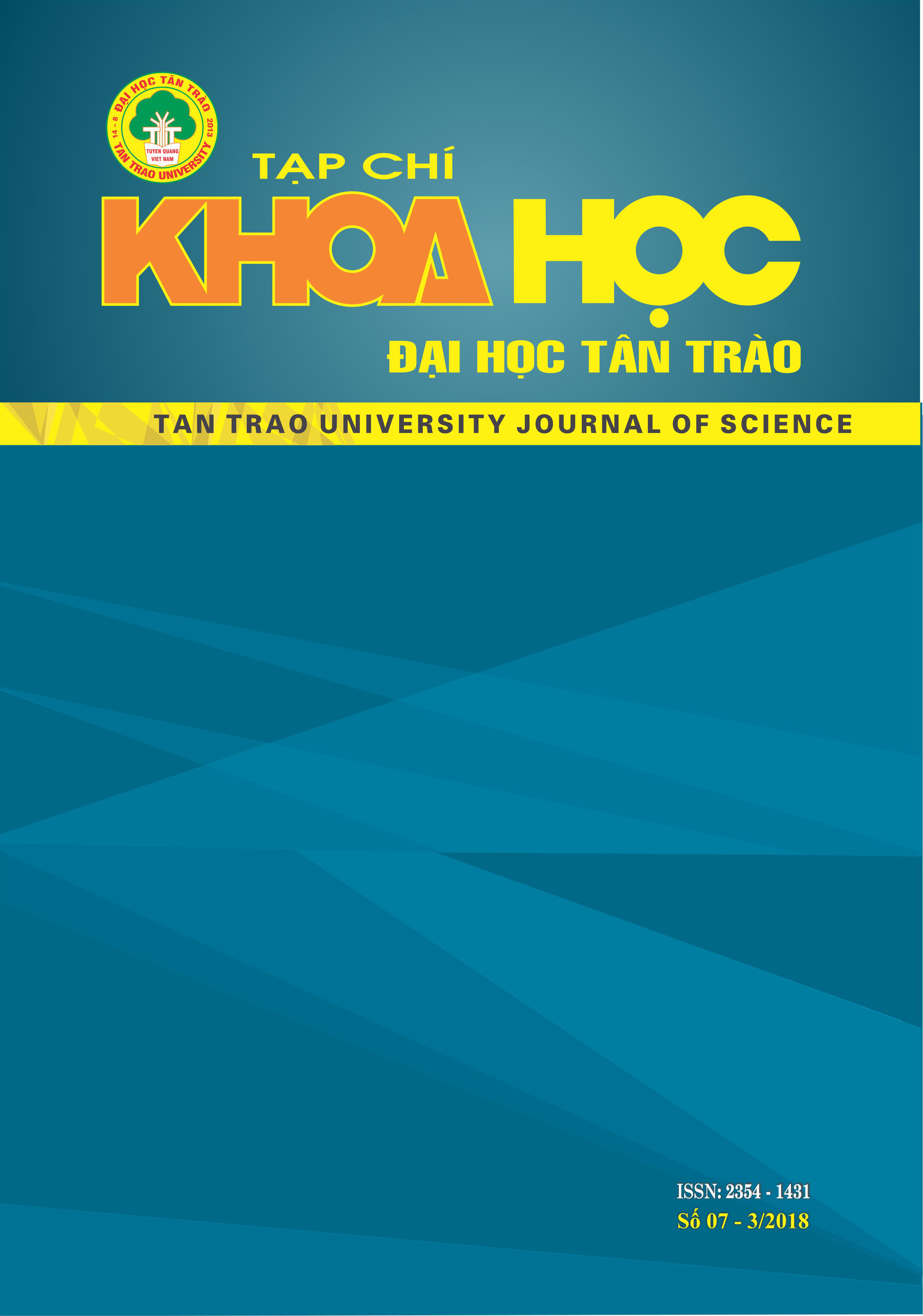Trường Đại học Tân Trào với vai trò đào tạo nguồn nhân lực cho sự phát triển kinh tế xã hội của tỉnh Tuyên Quang và một số tỉnh vùng Tây Bắc giai đoạn 2006-2015
DOI:
https://doi.org/10.51453/2354-1431/2018/151Từ khóa:
Students; human; officer; civil servants; Northwest.Tóm tắt
Trường Đại học Tân Trào được thành lập ngày 14 tháng 8 năm 2013 theo quyết định số 1404/QĐ-TTg của Thủ tướng Chính phủ Việt Nam, là một trường đại học công lập có nhiệm vụ đào tạo, nghiên cứu khoa học và hợp tác quốc tế của tỉnh Tuyên Quang và khu vực Tây Bắc. Đến nay, Trường Đại học Tân Trào đã đào tạo cho tỉnh Tuyên Quang và các tỉnh trong cả nước hàng ngàn cán bộ quản lý, giáo viên cho ngành giáo dục và các ngành khác. So sánh số sinh viên của Trường Đại học Tân Trào được đào tạo giai đoạn 2006-2015 với số cán bộ, công chức, cán bộ quản lý của tỉnh Tuyên Quang, đồng thời việc thống kê số sinh viên của các tỉnh lân cận được đào tạo bởi Trường Đại học Tân Trào, đã khẳng định được vị trí và vai trò to lớn trong công tác đào tạo nguồn nhân lực phục vụ sự nghiệp phát triển kinh tế - xã hội của tỉnh Tuyên Quang nói riêng, khu vực Tây Bắc và cả nước nói chung của Đại học Tân Trào.
Tải xuống
Tài liệu tham khảo
1. Báo cáo Tổng kết Đề tài khoa học cấp tỉnh “Khảo sát và đánh giá chất lượng nguồn nhân lực do Trường Cao đẳng Tuyên Quang đào tạo giai đoạn 2006-2012”, Sở KH&CN Tuyên Quang, tháng 5/2015;
2. Báo cáo số 198/BC-UBND ngày 29/7/2016 của UBND tỉnh Lào Cai về "Sơ kết 5 năm thực hiện kế hoạch phát triển nguồn nhân lực tỉnh Lào Cai giai đoạn 2011-2020";
3. Báo cáo số 113/BC-UBND ngày 18/8/2016 của UBND tỉnh Tuyên Quang về "Sơ kết 5 năm thực hiện kế hoạch phát triển nguồn nhân lực tỉnh Tuyên Quang giai đoạn 2011-2020";
4. Kế hoạch số 06-KH/TU ngày 13/6/2011 của Tỉnh uỷ Tuyên Quang về “Kế hoạch đào tạo, bồi dưỡng cán bộ công chức thực hiện mục tiêu Nghị quyết Đại hội Đảng bộ tỉnh Tuyên Quang lần thứ XV, nhiệm kỳ 2010-2015”;
5. Kế hoạch số 2471/UBND-VX ngày 16/11/2011 của UBND tỉnh Tuyên Quang về “Đào tạo bồi dưỡng cán bộ công chức, viên chức năm 2012”;
6. Nghị quyết số 02-NQ/TU ngày 13/2/2011 của Ban Chấp hành Đảng bộ tỉnh (khoá XV) về phát triển và nâng cao chất lượng nguồn nhân lực tỉnh Tuyên Quang giai đoạn 2011 - 2015, định hướng đến năm 2020;
7. Nguồn số liệu thống kê số lượng học sinh sinh viên của phòng Quản lý sinh viên Trường Đại học Tân Trào;
8. Quyết định số 2022/QĐ-UBND ngày 22/9/2011 của Chủ tịch Ủy ban nhân dân tỉnh Hà Giang về phê duyệt Quy hoạch phát triển nguồn nhân lực tỉnh Hà Giang giai đoạn 2011 -2020;
9. Quyết định số 121/NQ-UBND ngày 12/5/2012 của Chủ tịch Ủy ban nhân dân tỉnh Tuyên Quang về phê duyệt Quy hoạch phát triển nguồn nhân lực tỉnh Tuyên Quang giai đoạn 2011 -2020;
10. Quyết định số 22/QĐ-UBND ngày 24/7/2016 của Chủ tịch Ủy ban nhân dân tỉnh Yên Bái về phê duyệt Quy hoạch phát triển nguồn nhân lực tỉnh Yên Bái giai đoạn 2016 -2020.
Tải xuống
Đã Xuất bản
Cách trích dẫn
Số
Chuyên mục
Giấy phép

Tác phẩm này được cấp phép theo Giấy phép Quốc tế Creative Commons Attribution-ShareAlike 4.0 .
Bài báo được xuất bản ở Tạp chí Khoa học Đại học Tân Trào được cấp phép theo giấy phép Ghi công - Chia sẻ tương tự 4.0 Quốc tế (CC BY-SA). Theo đó, các tác giả khác có thể sao chép, chuyển đổi hay phân phối lại các bài báo này với mục đích hợp pháp trên mọi phương tiện, với điều kiện họ trích dẫn tác giả, Tạp chí Khoa học Đại học Tân Trào và đường link đến bản quyền; nêu rõ các thay đổi đã thực hiện và các nghiên cứu đăng lại được tiến hành theo cùng một bản quyền.
Bản quyền bài báo thuộc về các tác giả, không hạn chế số lượng. Tạp chí Khoa học Tân Trào được cấp giấy phép không độc quyền để xuất bản bài báo với tư cách nhà xuất bản nguồn, kèm theo quyền thương mại để in các bài báo cung cấp cho các thư viện và cá nhân.
Mặc dù các điều khoản của giấy phép CC BY-SA không dành cho các tác giả (với tư cách là người giữ bản quyền của bài báo, họ không bị hạn chế về quyền hạn), khi gửi bài tới Tạp chí Khoa học Đại học Tân Trào, tác giả cần đáp ứng quyền của độc giả, và cần cấp quyền cho bên thứ 3 sử dụng bài báo của họ trong phạm vi của giấy phép.






